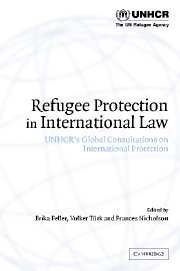Book contents
- Frontmatter
- Contents
- List of annexes
- Notes on contributors and editors
- Foreword
- Preface
- Acknowledgments
- Expert roundtables and topics under the ‘second track’ of the Global Consultations
- Table of cases
- Table of treaties and other international instruments
- List of abbreviations
- Part 1 Introduction
- Part 2 Non-refoulement (Article 33 of the 1951 Convention)
- Part 3 Illegal entry (Article 31)
- Part 4 Membership of a particular social group (Article 1A(2))
- Part 5 Gender-related persecution (Article 1A(2))
- Part 6 Internal protection/relocation/flight alternative
- Part 7 Exclusion (Article 1F)
- 7.1 Current issues in the application of the exclusion clauses
- 7.2 Summary Conclusions: exclusion from refugee status, expert roundtable, Lisbon, May 2001
- 7.3 List of participants
- Part 8 Cessation (Article 1C)
- Part 9 Family unity (Final Act, 1951 UN Conference)
- Part 10 Supervisory responsibility (Article 35)
- Index
7.2 - Summary Conclusions: exclusion from refugee status, expert roundtable, Lisbon, May 2001
Published online by Cambridge University Press: 28 August 2009
- Frontmatter
- Contents
- List of annexes
- Notes on contributors and editors
- Foreword
- Preface
- Acknowledgments
- Expert roundtables and topics under the ‘second track’ of the Global Consultations
- Table of cases
- Table of treaties and other international instruments
- List of abbreviations
- Part 1 Introduction
- Part 2 Non-refoulement (Article 33 of the 1951 Convention)
- Part 3 Illegal entry (Article 31)
- Part 4 Membership of a particular social group (Article 1A(2))
- Part 5 Gender-related persecution (Article 1A(2))
- Part 6 Internal protection/relocation/flight alternative
- Part 7 Exclusion (Article 1F)
- 7.1 Current issues in the application of the exclusion clauses
- 7.2 Summary Conclusions: exclusion from refugee status, expert roundtable, Lisbon, May 2001
- 7.3 List of participants
- Part 8 Cessation (Article 1C)
- Part 9 Family unity (Final Act, 1951 UN Conference)
- Part 10 Supervisory responsibility (Article 35)
- Index
Summary
The first day of the Lisbon expert roundtable addressed the question of the exclusion clauses of the 1951 Convention Relating to the Status of Refugees, basing the discussion on a background paper by Professor Geoff Gilbert, University of Essex, ‘Current Issues in the Application of the Exclusion Clauses’. In addition, roundtable participants were provided with the UNHCR Guidelines on the Exclusion Clauses and written contributions from the Government of the Netherlands and the Government of Turkey. Subsequently, written contributions were received from government experts of Canada, France, Turkey, and the United Kingdom and will be reflected in the report. Participants included thirty-two experts from twenty-five countries, drawn from governments, NGOs, academia, the judiciary, and the legal profession. Professor Georges Abi-Saab, former Justice of the International Criminal Tribunal for the former Yugoslavia, moderated the discussion.
In view of the limited time available, the discussion focused on those aspects of the background paper and the UNHCR Guidelines that were considered to be in need of clarification. The paragraphs below, while not representing the individual views of each participant or necessarily of UNHCR, reflect broadly the issues emerging from the discussion.
General considerations
In the wake of the Second World War, the drafters of the Convention contemplated certain types of crime to be so horrendous that they justified the exclusion of the perpetrators from the benefits of refugee status. In this sense, the perpetrators are considered ‘undeserving of refugee protection’.
[…]
- Type
- Chapter
- Information
- Refugee Protection in International LawUNHCR's Global Consultations on International Protection, pp. 479 - 485Publisher: Cambridge University PressPrint publication year: 2003

